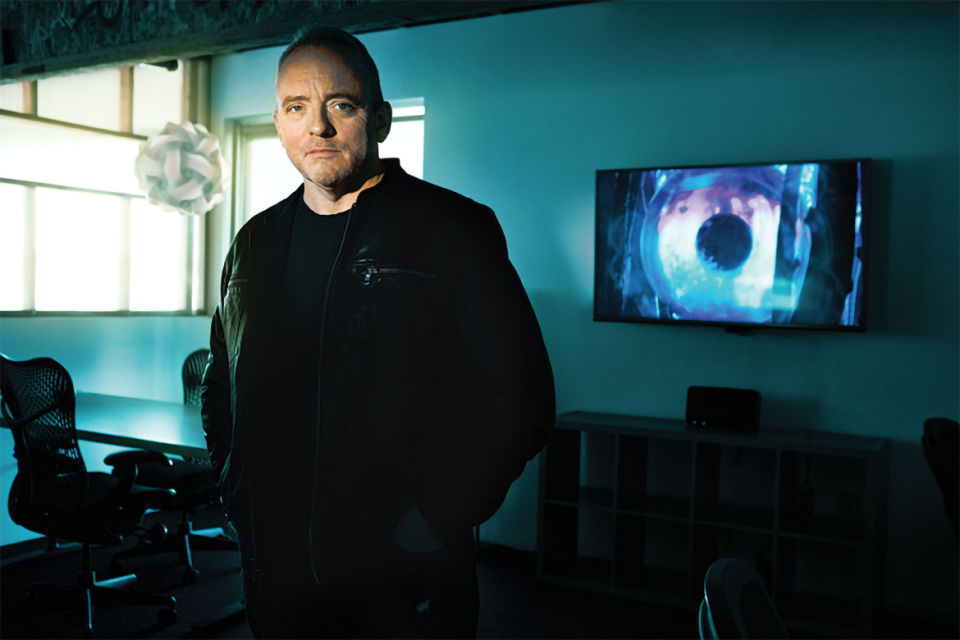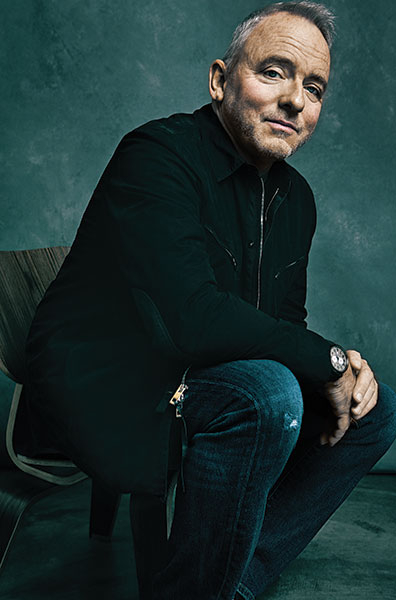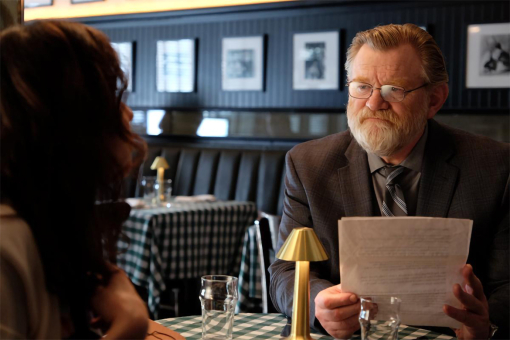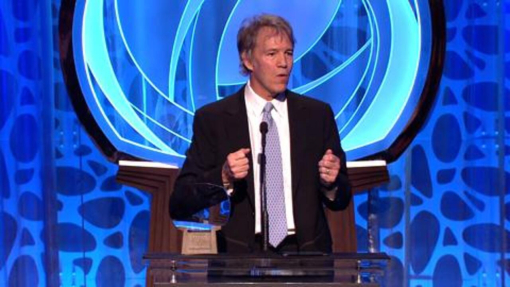When Stephen King dreamed up his first detective novel — a creepy cat-and-mouse game between a young psychopath and a retired cop — could even his storied imagination have foreseen how that book would affect another award-winning novelist?
Dennis Lehane, author of Gone Baby Gone, Shutter Island, Mystic River and 11 other books, has become central to Mr. Mercedes, the television version of King’s book of the same name. He says the role is part of “an on- going shift in my life” that began when he first got into television, writing for HBO’s The Wire and Boardwalk Empire.
At press time, he was well into formulating the second season of the Audience Network show, which has been shooting in Charleston, South Carolina.
The series title refers to a gruesome slaughter committed by antagonist Brady Hartsfield (Harry Treadaway), who drives a stolen Mercedes-Benz through a crowd of jobseekers, killing several before he drives away. Unable to identify the killer, and at the end of his career, Detective Bill Hodges (Brendan Gleeson) retires from the force. Soon, however, Hartsfield begins to taunt him, luring him back to resume the hunt.
Last season, Lehane was a writer and contributing producer on a team headed by two powerhouse showrunners: executive producer–director Jack Bender (Lost, Under the Dome) and executive producer–lead writer David E. Kelley (L.A. Law, Boston Legal, Big Little Lies).
Now, Lehane says his role has expanded to essentially “running the writers’ room” — penning several scripts and supervising all others for the show’s second 10-episode season, slated to debut August 22 .
“There were two major things that, if you’d asked me [a few years ago], I would not have imagined,” Lehane says, sipping tea in the show’s cozy Culver City, California, writers’ room. “If you’d asked, ‘Would I ever leave Boston and become a television writer?’ I would have said no. Those were hard-core non-negotiables, and now, I’ve done both.”
Surrounded by boards covered in notes that outline the second season’s arc, he adds, “I’ve made a different investment [compared to writing novels]. I have two little daughters, and that was a major attraction. When I’m writing a book, I have to dive in — first thing in the morning, I have to lock on.
"That first hour is very important, or else nothing gets written for the rest of the day. A script, on the other hand, I could write on the 50-yard-line of the Super Bowl, any time of day. That means I can take my daughters to school, drop them off, and then drive straight up the road to this office.
“I had heard a story about David Kelley that, at the height of his fame, when he had something like five shows on the air, he would always walk through the door to leave at 5:30 p.m. I heard that before I knew David Kelley. I decided if David Kelley could do that, then I can do it. So, when I took this job, I said, ‘David, the only thing is, three days a week, I have to be through that door by five o’clock.’
"And I’ll never forget what he said to me: ‘Nobody has ever had a good idea after 3:30.’ I spend that time trying to make sure our scripts are so tight, nobody would want to fuck with them.”
For his part, Kelley calls Lehane “one of the best screenwriters in our medium.” He says, “There is nobody who writes character better, no one more perfectly suited to mine the pathos that inhabits so many of the personas of the Mr. Mercedes universe. He gets the blue-collar world. He understands human suffering. His dialogue is often a form of poetry.
"So he runs the writers’ room and does most of the creative heavy lifting, and quite honestly, some of my best work involves staying out of his way.”
Bender, meanwhile, suggests Lehane is a perfect match for the unique pace of Mr. Mercedes, a show that lets viewers watch and wait as characters get dressed, go to the bathroom, eat a meal, pour a drink and light a smoke, among other things.
“Dennis knows how to sit with the characters and let them stew, letting them do whatever the hell they need to do before they even get up out of a chair,” Bender says. “He knows when to get them out of the chair and when not to. It’s all part of making them human.”
It’s fairly unusual to find multiple highly pedigreed writer-producer- directors teamed on a modestly budgeted non-broadcast-network drama. After all, the legendary Stephen King created the property and then partnered with Bender, an award-winning producer-director, to develop it as a TV show.
Bender brought in TV icon Kelley, and he, in turn, reeled in Lehane. “I’ve known Dennis for a lot of years,” King says. “He’s a straight arrow and a hard worker. If Dennis is involved with a project of mine, I feel safe. If he’s attached to something else, I watch. If he’s got a new book, I read. Big respect for him — he earns it.”
Lehane admits that working with such talent was among the project’s lures. “A chance to work on a Stephen King project? That’s pretty exciting, and then you tie with that a chance to work with David Kelley? I mean, come on,” he says.
“David approached me originally about another project, but I knew at the time he was gearing up on this show, so I asked him about it. We got into a conversation, he saw my excitement level, contacted my people, and boom, it was done in a weekend. The world of Mr. Mercedes was placed in the Midwest, the Rust Belt. It was totally in my wheelhouse.”
Bender suggests the show’s high-end talent mix is crucial because, after all, any good show “starts with the writing.”
He adds, “That means you have to leave your ego at the door and just say, ‘What’s the best way to do this?’ Sometimes, I might have a way to do it better [in production], but frequently, someone else has the better idea. When you are working with people of this caliber, you would be a real jerk to not listen to them. You would be minimizing the potential of what you are making.
"There is a real mutual respect with David, Dennis and myself. That’s part of the fun — it’s a collaborative medium, and it’s a gift to be working with people like Dennis Lehane and David Kelley.”
In running the writers’ room, Lehane says, “David is the general manager and I’m the coach.” But more specifically, he says he has evolved into “the filter that the show goes through on a textural level.
“With a team of writers, you need a filter to make clear what the tone is,” he adds. “You spend six weeks with these people in a room before you let them write anything, so they get that sensibility. And then, you see what they turn in. If it is tonally off, I tweak the tone.”
As successful as he’s been, Lehane’s ascension to point man for this team was a long time coming. It is, after all, very different from the lonely life of a novelist. He calls writing for The Wire and Boardwalk Empire “my training” for this, adding that he’s had a few “honorable failures” along the way that make him appreciate this opportunity.
“I like the idea of creating my own show,” he says. “I’ve created a few that have literally come to the point of the final step. For one show, there was a point where they were renting office space when it collapsed. I literally got on a plane — to go to Germany on a book tour — as a showrunner, and when I landed, [the project] was dead.
"I had another show with Don Cheadle that we worked on for three years. We thought it was a go, and then it was not a go. That one damn near broke me. It’s a crazy industry.”
Crazy perhaps, but Lehane jumped in anyway with Mr. Mercedes. That doesn’t make him, even now, a “TV guy,” however. He prefers to see himself as “a writer,” regardless of titles and credits, though his precise credit on season two (which he did not know at the time of this interview) is executive producer.
“The Wire was my first work in episodic TV,” he explains. “The other writers here have more experience and training in television than I do. Plus, [The Wire] and Boardwalk Empire didn’t have conventional writers’ rooms, which I found wonderful.
"And because that was my training, I sometimes have to say, ‘What’s that?’ when our writers reference certain things. I don’t know a lot of the habits and techniques that television writers seem comfortable with, so that allows me to approach the work differently.”
So why write for television at all? Lehane has sold millions of books, won several literary awards and seen four of his books turned into feature films, including 2004’s Oscar-winning Mystic River, directed by Clint Eastwood.
“Novels can be pretty lonely,” he explains. “I was tired of that. I don’t think I have the classic introverted personality of most writers. I don’t like sitting in rooms alone. I’m kind of gregarious and want to have fun — I like the social game. It was while working on Boardwalk that the lightbulb really went off.
"I had to move to Brooklyn for three months, and I would get up every day and drive to work like a normal person, which I had not done in almost 20 years. I liked it. So I moved to L.A. to explore a couple things, and this part of my life started to take off. I just said, ‘I’m going to go with this.’”
Compared to writing novels, writing a teleplay or screenplay involves “a different type of pride of ownership,” Lehane says. Quoting another respected novelist-screenwriter, he says, “Richard Price had a great line: ‘Nobody puts their scripts on a shelf.’ You don’t bind the script, put it on a shelf and go, ‘Ahh,’ the way you do with your books. It’s a different vibe.
"There is always a huge question mark with a book — if you write them the way I write them, anyway. That question is: how long is it going to take me? Some writers can produce a book in a year — I’m not that guy.
“But I really enjoy [collaborating]. On a feature film, I’ve been a gun for hire. You know 146 people will weigh in, and I’ll be powerless. But with television, we have a very involved director in Jack Bender, who is the other showrunner, and he and I engage. We get minimal notes, but it is all creative stuff.”
One notable similarity between his literary and television writing, Lehane says, is the winding path he takes to find his story beats. “There is a great anecdote about Flannery O’Connor talking about a short story she wrote called ‘Good Country People,’ which ends with a Bible salesman stealing a wooden leg from a woman in a barn.
"She said she didn’t know he was going to do that until about 16 lines before he did it, at which point, she said she knew it had been inevitable since the first sentence. That’s what I write for — she called those ‘happy accidents.’”
In the case of Mr. Mercedes, however, the writers have a road map: they’ve been tasked with adapting the beaten-down, rough-edged characters King created, along with the depressed, working-class Ohio town he invented.
“I don’t think any of us would have gotten out of bed for a story that was just about a retired cop chasing a killer,” Lehane says. “What brought us specifically to that world was what Stephen King set up metaphorically.
"What are characters doing [when the story begins]? They are looking for jobs. When does it take place? Right after the [2008] economic crash. What happens? Someone in a big, heavy, globalized automobile runs those people over in an act of domestic terrorism. It’s about that, and the Midwest — an area that feels abandoned.”
In the past, Lehane has been on the other side of the adaptation equation, as others transformed his novels into movies. Those experiences have given him a unique perspective on how to maintain what is “King” about Mr. Mercedes.
“The standard I have for my own work is, I don’t expect you to get the micro [from my novels] at all,” he says. “If you were to translate a book to a feature film, that would be impossible — it would be a 10-hour film.
"But that is why episodic TV is perfect for a novelist — there, 10 hours is about right. But even for a 10-hour format, you know right away they will throw out about 80 percent of the [nuances] of your book right off the bat. But you want the spirit protected at all costs.
“A perfect example is the final shot of Gone Baby Gone, ” he says, referring to Ben Affleck’s 2007 film based on Lehane’s own novel. “There, they visualized something that, in the book, is completely internal. A man sits on a bench, thinking about the mistakes he’s made — that’s how the book ends.
"But for the movie, [the filmmakers] made the choice ultimately to visually do it with a shot of the main character and a little girl, sitting on a crappy couch, watching TV in a crappy apartment. It’s a beautiful visualization of exactly what I had in the book — to show a sense of terrible loss and a fractured, shaky hope.
“That’s what we’re doing with Stephen King’s material. If we are respectful of the spirit of his work, just about everything else is fair game. Then, I have to draw that out to the best of my ability.”
Lehane says the show’s second season is based on portions of the next two books in King’s trilogy — Finders Keepers and End of Watch. Conceptually, it will be about “the brain of Brady, who sits in a mental ward, where weird things start to happen.”
However long the show lasts, Lehane believes Mr. Mercedes will end up being notable for the collaborative way it’s built. “It’s the underlying material — Stephen wasn’t just writing gumshoe stuff,” he says. “And it’s David Kelley’s sensibilities. He set the tone with the pilot.
"You have another showrunner in [Bender] who really understands the writing process. Then you bring in people with my sensibilities and [the other senior writer] Bryan Goluboff’s sensibilities. We’re just working-class guys, Bryan and I. He’s from Brooklyn and I’m from Dorchester.”
From Dorchester to Culver City … is that transition permanent? Does Lehane see moving back to Boston any time soon? “Probably, I guess — I don’t really know,” he says. “But could I leave this world [of Mr. Mercedes]? Paradoxically, probably not.”
Lehane’s transition from novels to television, however, is clearly a two-way street. “I had a novel released last year [Since We Fell] and have another planned, so I’ll write novels when I get a runway,” he says. “I don’t know exactly where life is taking me right now in that sense, but that’s a nice feeling.”
This article originally appeared in emmy magazine, Issue No. 6, 2018












